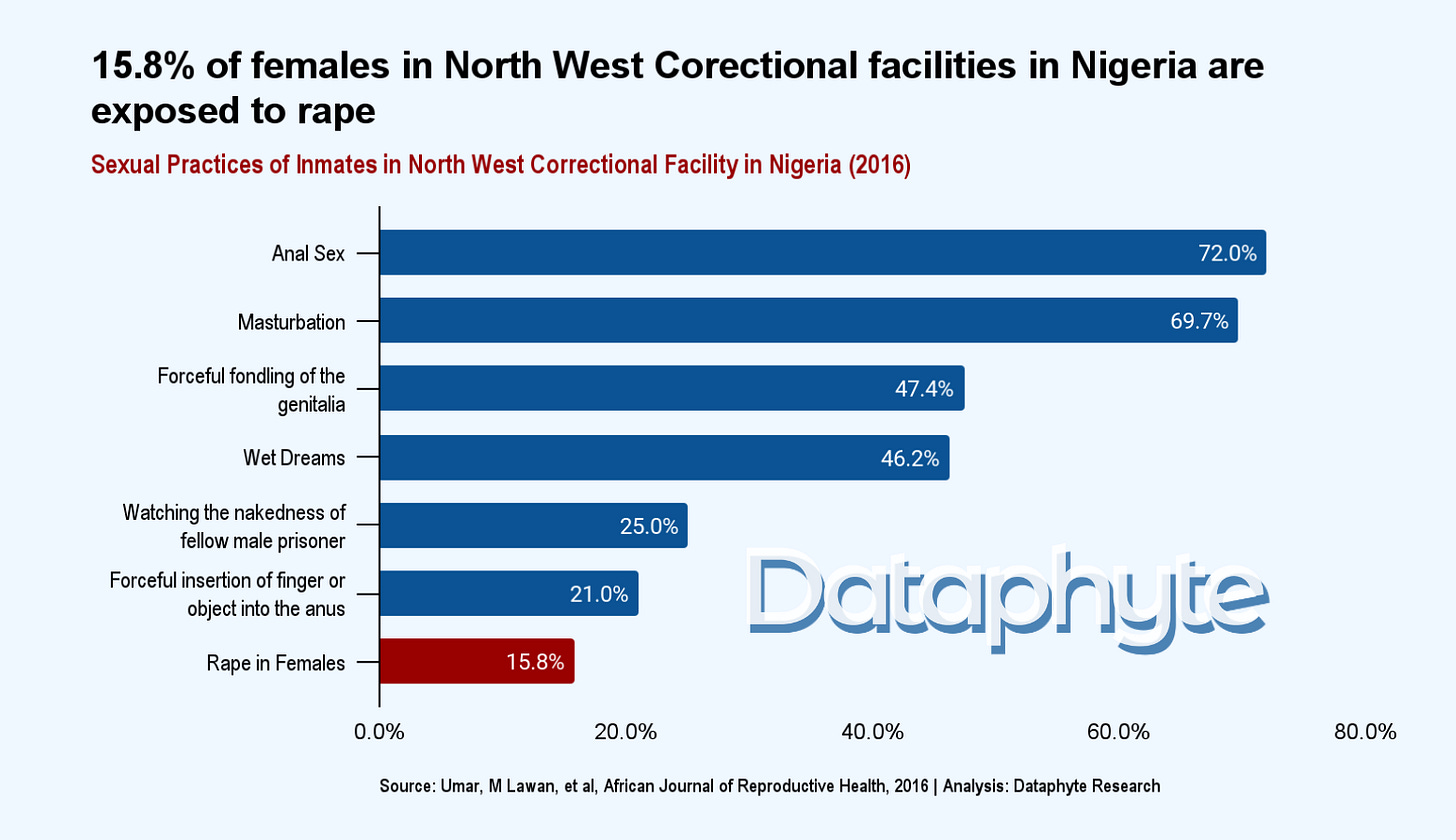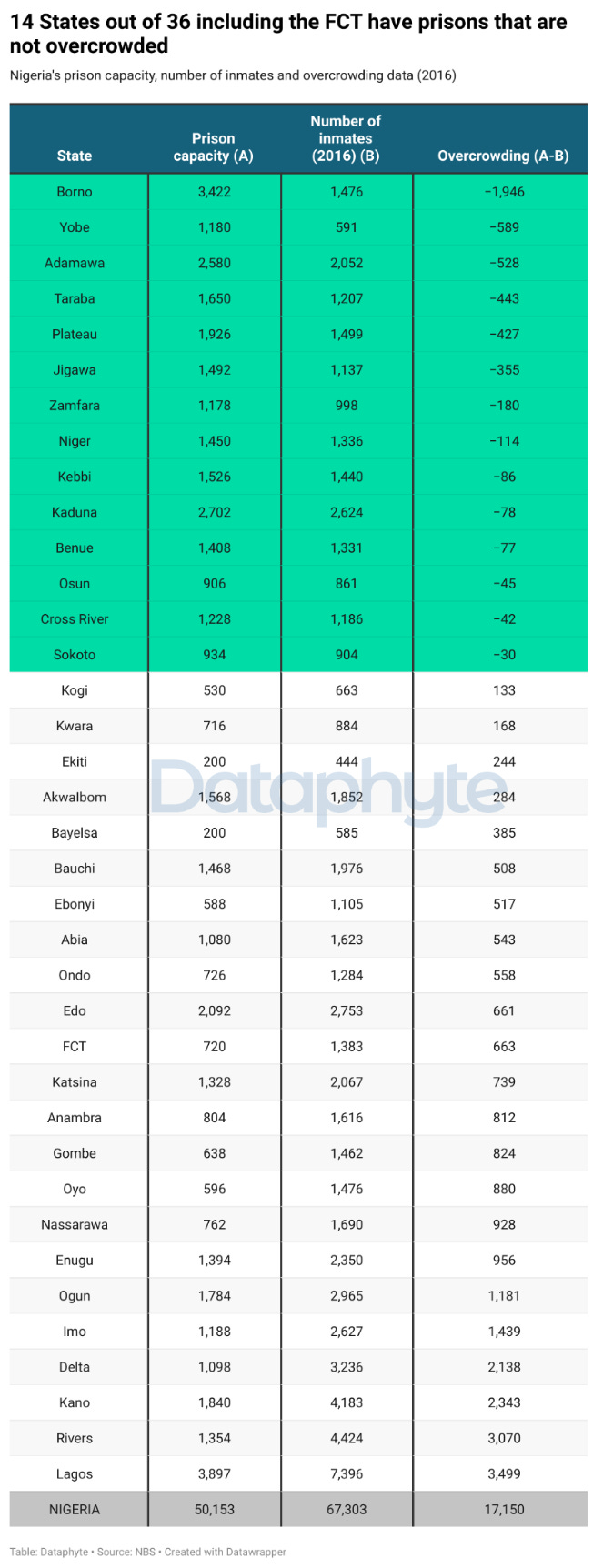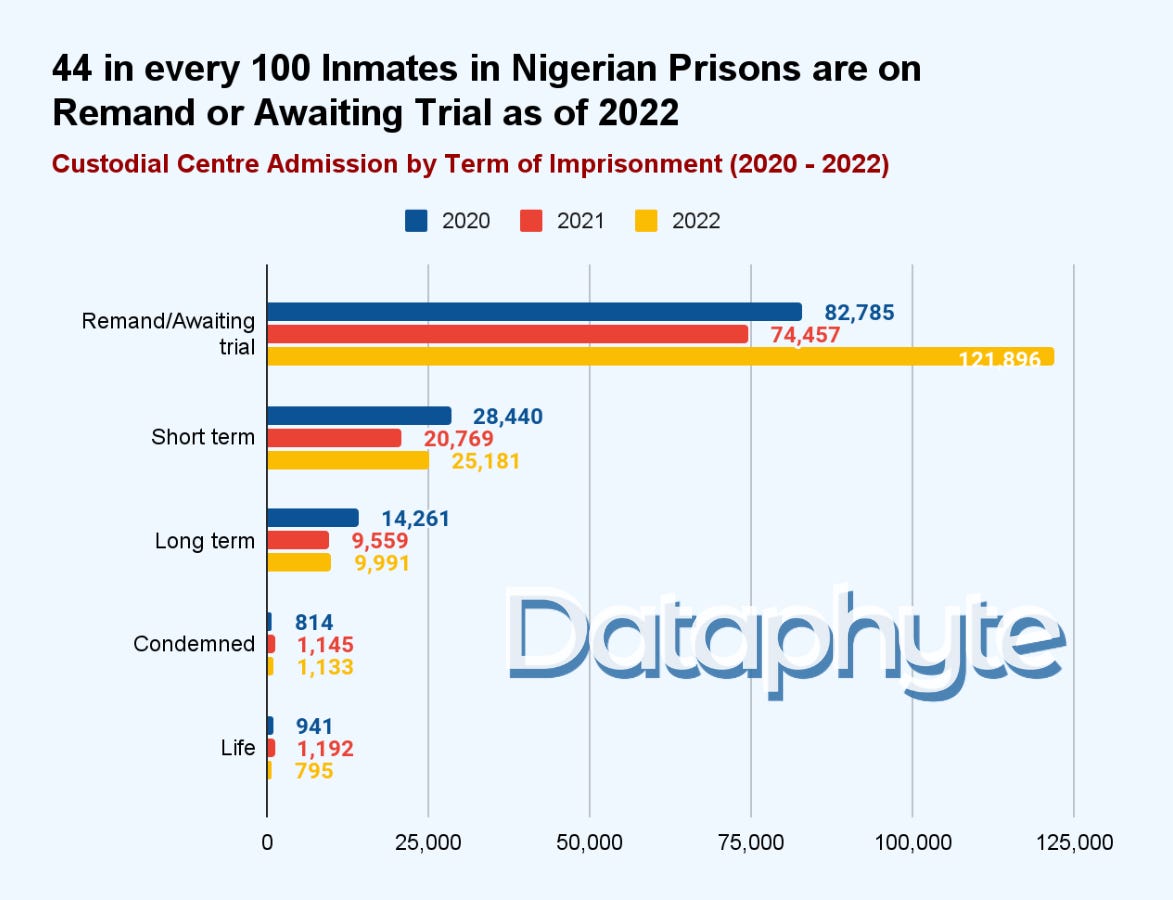The population of female inmates in Nigerian prisons is growing faster than that of male inmates, and Nigeria has only two women-only prisons out of a total of 241 facilities.
The higher growth rate among female inmates raises concerns because a very fast increasing female inmate population may predispose women more to overcrowding in mixed-gender facilities.
Overcrowded mixed-gender prisons come with varied concerns including lack of privacy, security, and gender-specific healthcare.
Adverse conditions as these may be detrimental to women’s mental and physical well-being and heighten their vulnerability to gender-based violence.
According to the 2023 social statistics report, the percentage growth rate of female inmates stood at 26.4% while the growth rate of men is less than half of that, at 12.7% in 2022.
In the same light, the percentage of female inmates in proportion to the total number of inmates in Nigeria has increased from 1.9% of the total inmate population in 2020 to 2.1% of the total inmate population in 2022.
Conversely, the percentage of male inmates decreased during the three-year period.
The Plight of Women in Mixed Prisons
The overcrowding in mixed-gender prisons may disproportionately affect female convicts.
Female inmates in overcrowded mixed-gender prisons face a number of serious risks that could seriously affect their well-being.
One of such instances played out in a research on the Sexual Health of Prison Inmates: A Case Study of Kano Central Prison, North Western Nigeria, conducted by Umar M. Lawan and colleagues, which found that 15.8% of female inmates reported being raped, while 82.5% of all male convicts indicated having sexual cravings while imprisoned.
Another important area where female prisoners are disadvantaged is healthcare.
Women have unique healthcare needs, such as those related to pregnancy and reproductive health, which are frequently unmet in institutions that are primarily intended for males.
According to a report by Amnesty International, the overpopulation in jail facilities facilitates the commission of sexual violence, including rape, and occasionally allows it to go unreported.
This emphasises how urgently changes are required to meet the unique requirements and vulnerabilities of female prisoners housed in overcrowded mixed-gender facilities.
According to data published by the World Prison Brief (WPB) in January 2022, there are 18 women in every 1000 inmates in Nigeria, and the country only has two prisons specifically for women.
This makes it difficult to ascertain the capacity of all the female prisons, especially prisons that are included in mixed-gender correctional centres to determine if they are overcrowded or not.
The two all-female correctional facilities, Kirikiri Female Prison in Lagos and Numan Old Prison in Adamawa are the only prisons built specifically for women in Nigeria.
The Kirikiri Female Prison has a total capacity of 211 persons while the Numan old prison has a capacity of 400 persons.
As of 2018, according to the National Human Rights Commission (NHRC) Prison Report, Kirikiri Female Prison has a total of 293 detainees, showing an overcrowded population of 82 persons.
Overcrowded Prisons: Factsheet
According to the most recent social statistics report of 2023, Nigerian correctional centres are designed to accommodate 58,278 inmates, but recent data shows that 158,996 people, male and female, were admitted in 2022.
Only 14 states in Nigeria have prison population shortfalls, according to a state review of the number of jails and inmates in each state as of 2016.
The remaining 22 states including the FCT all have overcrowded prisons.
Key Drivers of High Prison Populations
Key drivers of these high prison population rates include the excessive use of pre-trial detention and the imprisonment of individuals for minor, petty offences.
In Nigeria, while some inmates are being remanded, others are serving short-term or long-term sentences, and some have been condemned and sentenced to life imprisonment.
Additionally, social statistics data reveals that the percentage of people remanded or awaiting trial constitutes 76% of the total number of inmates in 2022.
A legal practitioner, Barrister Ikeoluwa Rofiat, explained that overcrowding in most Nigerian correctional centres is often caused by delays in legal proceedings.
"Many times, police bring suspects of serious crimes like murder, armed robbery, and rape to the magistrate court, even though this court does not have the authority to hear these cases.
The magistrate then instructs the suspects to seek advice from the Department of Public Prosecution (DPP) in the Ministry of Justice of their state so that the case can be properly filed at the high court.
"In these situations, the magistrates order that the suspects be held in prison until they are transferred to the high court by the police for a bail hearing," she explained.
According to Penal Reform, overcrowding is arguably the biggest problem facing prison systems; its consequences can be life-threatening and prevent prisons from fulfilling their proper functions, especially for the fast rising female prison population.
Thanks for reading this edition of SenorRita. It was written by Khadija Kareem and Kafilat Taiwo and edited by Oluseyi Olufemi.








